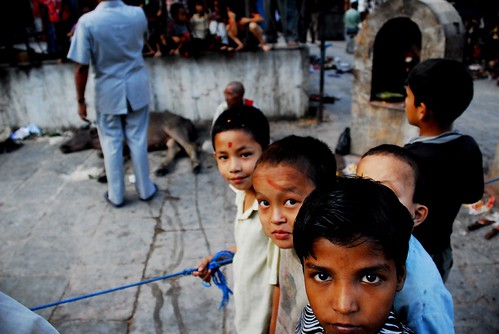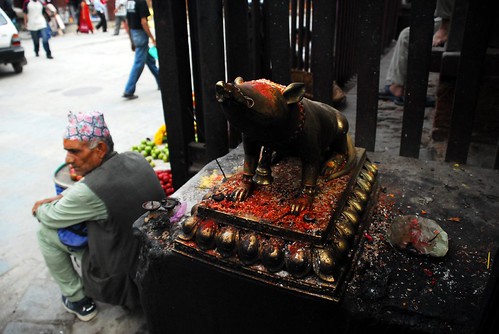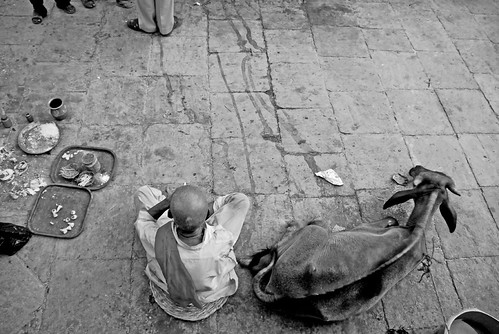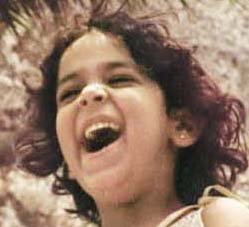Wednesday, November 21, 2007
light and dark
Her right arm is resting on the knee of the bent leg, her head bent at an angle, as she looks at the cars going by. At one in the morning, there isn't exactly much traffic on this road. I wonder what she's thinking as she looks out; her gaze is unwavering, her face unchanging except for reflections of passing headlights, alternately light and dark.
Wednesday, November 14, 2007
One night in Kathmandu
Urban Gypsy - Kathmandu
What struck me first was the number of children in the waiting crowd. While I was trying to psyche myself into bravado, they were running around fearlessly. Playing catch and almost tripping over the priest, while I found it hard to look away from the buffalo waiting to be sacrificed. Oblivious to the children’s antics and the flutterings in my stomach, the priest was meticulously laying out the ingredients of a familiar ritual.
There was going to be a full moon in Kathmandu that night…

Heart of the old city
We’d rolled into Kathmandu late the previous evening. Tired, but hungry, we headed out in search of dinner. But walking through the tourist district of Thamel, it felt as though we’d been plunged into some postmodernist dystopia of neon lights, loud music, drug pushers and American convenience stores.
In the brightness of the next morning, Kathmandu seemed friendlier. Ready to make the most of our only day in the Nepali capital, we headed to Durbar Square. The complex comprises the Royal Palace that was the home of the Nepali rulers till recently and about 50 temples. Closed to cars, it’s perfect for a long mid-afternoon stroll, weaving your way among the temples. The lack of traffic means it’s a convenient hangout for local teens and couples, as well, sitting comfortably on the large stone steps. Exploring the temples took us a couple of hours, but the one that really caught my attention was the Kumari Che– the temple to the Living Goddess. The young girl looking down at us from the balcony had been selected as a reincarnation of Goddess Taleju at the age of four. According to tradition, she would stay at the post till she reached adolescence. I wondered what life for her would be like after that.
The only way to know was to speak to a former Kumari. We found out from a priest that a former living goddess, Rashmila Shakya, lived close by and decided to track her down.
But before that, we had another appointment.

As the moon looks on
At one corner of the Durbar Square is a temple of Lord Shiva and Goddess Parvati. We’d been told that every full moon, a goat and buffalo are sacrificed to them and their idols washed in the warm blood. Animal sacrifices in a crowded square in the capital city? This I had to see.
The sacrifice began as the sun started to dip below the horizon. Two men rapidly trussed up the goat and slit its throat before the altar; warning onlookers to step away. A collective gasp went through the crowd as the goat’s life drained out of its body, one plaintive bleat silenced even before it was over. Finally, the severed head was placed before the idols. I willed myself to look, thinking that if I could eat meat, I should be able to watch or be called a hypocrite.
The buffalo was trussed up next; its mouth roped shut, legs tied together. Unlike the goat, which could be lifted to the altar, the buffalo posed a problem for the men. To ensure that the blood reached the idols, its throat was skinned, a vein identified and slit; and a foot planted on buffalo’s stomach to apply pressure and pump the blood out. It was gory, yet not one person, including all the children, looked away. We were all held in place by morbid fascination.

In search of a goddess
Walking through the narrow streets of old Kathmandu, we tried to shake off the impact of what we’d seen and look for the Kumari. Once we found her locality, it was easy to get directions to Rashmila Shakya’s house; goddesses are well-known. And though we turned up unannounced, she agreed to meet us.
One would think that the transition from divinity to mortality would not be an easy one. But Rashmila Shakya seemed to have managed it with relative ease. There was dignity in her shyness, and even her ‘flaws’ had a touch of the divine. She doesn’t speak fluent English because conventional education was thought unnecessary for a goddess. And she has two balding spots on either side of her head, the result of having her hair constantly pulled back in the hairdo of a Kumari.
She was once at the head of processions that thousands participated in; today she is an IT engineer, applying for jobs like any other 24-year-old. Yet, she doesn’t think that her two realities are incompatible. “The way I think of it,” she said, “I’m luckier than other people because I have had a chance to live two different kinds of lives. I miss feeling that importance sometimes, but here I am among my family, and they make me feel an important part of their lives.”
She talked to us about growing up in the Kumari temple, its rituals, about returning home to family life, and being the only Kumari who is a graduate. As we said our goodbyes, I managed to get her to recommend her favourite Nepali dishes.
That knockout Roxy
The first thing we did after leaving her house was to write postcards to our families, “A goddess recommended my dinner menu!” The second thing was to go to a restaurant in Thamel and order those dishes. Kathmandu’s coup de grace in a day of sensory overloads was a mud tumbler full of ‘Roxy’, a local brew that came with the food. She’s a knockout, that one.
The brilliant photos were taken by Akshay, who learnt something about himself that day; that when he's behind the camera, he can take just about everything.
Tuesday, November 6, 2007
On top of the mountain
A version of the following was published in the Hindustan Times about a month back. All these words and still, I was able to say nothing about the quiet exhilaration of that moment when the rain let off for fifteen minutes and I set out on a solitary stroll. Down, past the stream, to the outermost outcrop of mountain overlooking the horseshoe river. Where I sat and looked at the v-shaped patch of sky where two mountain slopes met. I felt alive and content and peaceful.
But, read about the rest.
On top of the mountain
Who would've though that cooking and eating a packet of Maggi could be such a complicated affair? But the truth is that at 13,000 feet, the two-minute-noodles take a whole longer than that to cook. And demand a lot of gymnastics.
First, you have to pray for the rain to stop. Then, you have to shelter the stove behind a pile of rocks. When that proves inadequate, the only option is to use your body as a shield from the cold biting wind. Even so, the flame goes out every 30 seconds, and you have to stay alert and re-light it quickly. Eventually, the water boils and you toss the Maggi in. A longer eventually later, it's ready to eat.
Taking the food out on a plate is a bad idea. There, on the top of the mountain in the middle of the night, it cools down almost instantly. The only way to eat it warm is for all five campers to sit around the stove and eat directly from the kettle, passing around the sole fork.
In the beginning, there was the sun
When you've just driven 3,200 km across two countries in a red three-wheel autorickshaw, driving on one of the highest motorable roads in the world seems like the next logical thing to do. Which is why, when we reached Manali at the end of the Monsoon Rickshaw Run with a day to spare, we decided to head up to
Almost no one who we met or spoke to thought the rickshaws could go up the steep, barely-there roads. But then, almost no one had thought we could make the trip from Kolkata to Manali either. Without falling off a mountain, being stranded without petrol, having a major breakdown or getting caught in torrential rain. None of those things had happened. How could this be any different?
Tempting fate
When we set out from Manali, the day was cold and clear. We fuelled up at the last petrol pump out of the hill station. According to our calculations, a full tank would be just enough to get us about 10 km past Rohtang Pass to a place where we could camp, and then back to the petrol pump again. For safety, we filled up a jerry can with extra fuel, which went with Chris and Owen who were accompanying us in their autorickshaw.
The drive up took over four hours. Many times, we had to get off the rickshaw and push it up steep inclines, then run and jump into it as the one behind the wheel kept it moving. But the views were worth the labour. Nothing could dampen the exhilaration we felt when we looked down at the curving steep road behind us. As we went higher, the vegetation became sparse, and dotted with patches of white ice.
Then, a landslide blocked our path and it seemed we would have to turn back. But the workers managed to clear enough of the road to give us a space to squeeze through. Twenty minutes before Rohtang, we passed a wide waterfall that had frozen over. Behind the hard packed ice, we could still hear the water flowing. It seemed magical.
The
Watch what you wish for
It started drizzling just as we finished setting up camp on a grassy hillside 17 km beyond
Owen, the ever-genial Brit, stuck out his palm to catch the rain and said, "Is this the monsoon… where is all that torrential rain I heard of?" We shushed him and looked around anxiously. And sure enough, the heavens decided to oblige him and fulfil his wish.
What looked pleasant and picturesque in the warm sunlight, became majestic and awe-full when the sky became overcast and all was shadows. With the rain came the cold winds and the temperature dropped suddenly. All five of us huddled inside the larger tent, listening to the raindrops breaking loudly on the cloth over our heads, trying to calculate just when the waterproof material would become too wet to be waterproof anymore, or whether the other tent would survive the strong winds.
It was past
Murphy's Law*
Morning couldn't come quickly enough. With the first sign of light, I started to unzip the tent an inch at a time, hoping to slowly acclimatise myself to the cold outside. At least, it wasn't raining. We quickly packed up camp and made ready to leave. But just as we finished, it started to rain again.
If you thought driving up the
Pouring the fuel into the tank turned our fingers blue. As it evaporated from our fingers, it made the already biting cold we were in seem like child's play. But by this time, we were beyond caring. We just needed to get off this mountain.
We drove like we'd never driven before in our 15 days with the autorickshaw. We'd been caught in torrential rain, and stuck without petrol. The only reason we didn't end up down a hillside somewhere is that some magical hand must have been guiding us, because we drove at a speed of 40 kmph down that hill, slowing down for nothing, not potholes or hairpin turns.
Distant dream
Back in Manali, after a warm shower and with a cup of hot tea in our hands, the events of the previous night and the morning already seemed distant and unreal. Now that we were dry and warm and well-fed, we could laugh about our adventures and file them under 'experience of a lifetime'.
As we'd kept reminding ourselves while we shivering up on that mountain, some things are better in the retelling.
* 'Whatever can go wrong will go wrong, at the worst possible time, in the worst possible way'

